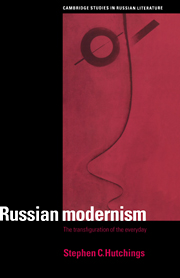Introduction
Published online by Cambridge University Press: 28 October 2009
Summary
The trivia and atoms of life past have been studied to exhaustion and their final poet has been given to us … If not Chekhov, that last bard of decomposing trivia, then surely someone will show us a way out other than Moscow and old galoshes? … Surely Chekhov is not art's end-point?
(Zinaida Gippius, 1904)What is there left to express? Cobwebs, sighs, the last elusive thing … From that point of view I am finishing literature and have finished it.
(Vasilii Rozanov, 1915)In this book I treat what I identify as an epistemological conflict at the core of Russian literary conceptions of the everyday. I will introduce my theme through two brief examples from the Russian literary canon. I begin, however, with a scene from a French classic.
In an episode from Flaubert's Madame Bovary the unhappy heroine is taken to the Rouen opera by an unsuspecting husband in an effort to hasten her recovery from a nervous illness suffered in the wake of her cynical abandonment by Rodolphe, her seducer. Flaubert juxtaposes the mundane, petit bourgeois prattle of the subscribers with the undulating emotions of Emma Bovary. Struggling to persuade herself of the mismatch between the dramatic peripetiae of the romantic novels she reads and the dreariness of the provincial reality imprisoning her, Emma sees in the operatic scene played out in front of her a depiction of her own life as it should have been: “All her attempts at denigration evaporated before the poetry of the singer's role which envelopped her and, drawn towards the real man by the illusion of the character.
Information
- Type
- Chapter
- Information
- Russian ModernismThe Transfiguration of the Everyday, pp. 1 - 10Publisher: Cambridge University PressPrint publication year: 1997
